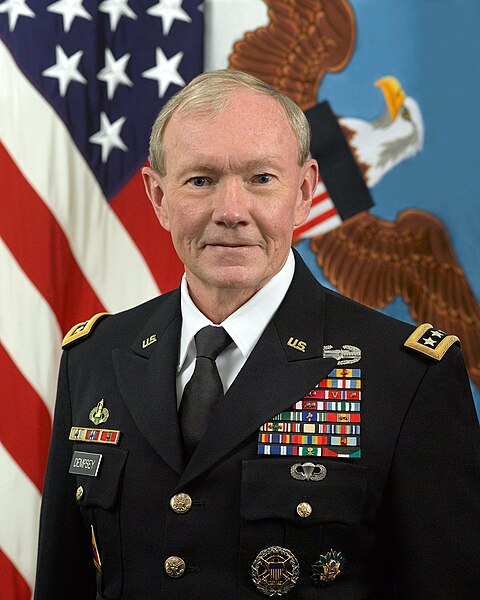 |
| Gen. Dempsey (Wiki Info - Image: Wiki) |
By Karen Parrish
American Forces Press Service
TOKYO, April 26, 2013 – North Korea and China led the list of topics Army Gen. Martin E. Dempsey, chairman of the Joint Chief of Staff, discussed today in a series of meetings with senior Japanese leaders here.
Dempsey, who is wrapping up a weeklong visit to the region that also included stops in South Korea and China, attended separate meetings today with Prime Minister Shinzo Abe, Defense Minister Itsunori Onodera, Foreign Affairs Minister Fumio Kishida and Gen. Shigeru Iwasaki, chief of the Japanese Self Defense Forces Joint Staff.
During brief remarks at the top of the chairman’s meeting with Onodera, the minister said he welcomed the chance to exchange views on North Korea. Onodera, through an interpreter, noted North Korea’s missile launch in December, its subsequent underground nuclear test in February and repeated ensuing threats.
He also noted that Dempsey just completed a visit to China, “and China’s position on North Korea is also important.” Onodera said he was interested in exchanging views with Dempsey on China, as well.
The chairman said he and the senior Japanese leaders “have many things to talk about,” adding that all topics would be discussed “in the framework of our strongest alliance in the Pacific, Japan.”
Later, during a brief joint press conference with Iwasaki, Dempsey noted the U.S. and Japan are working closely through the current tensions generated by Pyongyang. Those tensions bring with them opportunities, the chairman said, “for greater cooperation, greater integration [and] interoperability, and we’re eager to take advantage of those opportunities.”
Asked for comments on his visit to China, the chairman said it was “very positive” and in line with conversations President Barack Obama and Chinese President Xi Jinping have had about furthering the two countries’ relationship.
“At the military-to–military level, I reinforced that a peaceful and prosperous China is in everyone’s interest, in the region and globally, [and] that we could certainly pursue a new relationship,” Dempsey said. “But … it would be pursued in the context of our existing relationships with very important allies in the region, including and especially Japan.”
Dempsey said that while in China he had also discussed “North Korea and the sustained level of provocation, as well as issues in the East China Sea and related to Taiwan.”
China and Japan both claim a group of islands in the East China Sea. U.S. policy is not to intervene in territorial disputes, but to advocate the peaceful resolution of such issues.
The chairman noted that in discussing the dispute in China, “I restated our policies, which are very familiar to you, but which include, of course, our intentions of living up to our [mutual defense] treaty obligations to Japan. But also, the deep connections that we have with Japan as a flourishing democracy in this part of the world; a relationship that we value deeply.”
Dempsey said he hopes his trip to China “will lead to some of the opportunities I mentioned moments ago, and that we’ll have a stabilizing influence on each other as we move forward.”
Responding to a question on the U.S. defense budget, the chairman acknowledged there are near-term challenges.
“But we will work through them and we will remain the military power we need to be in order to live up to our global responsibilities and, importantly, our alliance responsibilities,” he said.
